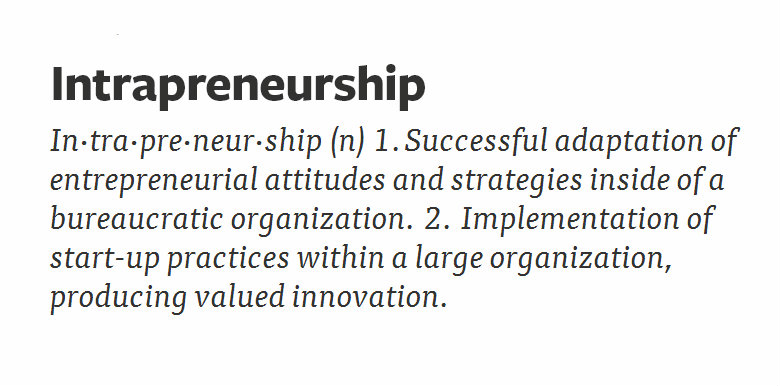A Beginner’s Introduction to Institutional Innovation
Written by Joe Agoada and Jennifer Estevez, Co-facilitators of TC108a: Intro to Intrapreneurship
Intrapreneurship defined
In·tra·pre·neur·ship (n) 1) Successful adaptation of entrepreneurial attitudes and strategies inside of a bureaucratic organization. 2) Implementation of start-up practices within a large organization, producing valued innovation.
Where does the term intrapreneurship come from?
The word “intrapreneurship” sounds like a new term, but it in fact has some history to it. The term was first discussed in a 1978 piece by Gifford and Elizabeth Pinchot titled “Intra-Corporate Entrepreneurship (Some Thoughts Stirred Up by Attending Robert Schwartz’s School for Entrepreneurs)”. Norman Macrae’s 1982 Economist article, “We’re all Intrapreneurial Now” further explores intrapreneurship and gives naming credit to the Pinchots. However, the word seems to have gone into relative hibernation until the dot.com bubble burst and Silicon Valley innovators started to look beyond the newest internet start-up for growth in the technology sector.
Intrapreneurship vs. entrepreneurship, per Guy Kawasaki
For a modern understanding of intrapreneurship, we can look at one of its most vocal proponents: author, motivational speaker, and venture capitalist Guy Kawasaki. Kawasaki was an early employee at Apple and a “chief evangelist” at the company for years. With his 2004 book, Art of the Start, he began making direct references to intrapreneurs and has recently become a more vocal advocate. For example, he wrote this July 2013 blog post on LinkedIn on “The Art of Intrapreneurship”. Here’s an excerpt:
- “There are lots of guys and gals inside established companies who are as innovative and revolutionary as their bootstrapping, soy-sauce-and-rice-subsisting, external entrepreneur counterparts. This is for these brave souls who face a different kind of reality and must practice the art of entrepreneurship inside a company—or “intrapreneurship.'”
- “From the outside looking in, entrepreneurs think intrapreneurs have it made: ample capital, infrastructure (desks, chairs, Internet access, assistants, lines of credit, etc), salespeople, support people, and an umbrella brand. Guess again. Intrapreneurs don’t have it better; they simply have it different. Indeed, the reality is that they probably have it worse because they are fighting against ingrained, inbred, and inept management.” – Guy Kawasaki
Bottom line: intrapreneurship is difficult, challenging, and nuanced.
Defining intrapreneurship: the starting point to inspiring institutional innovation
Understanding exactly what intrapreneurship is can be a starting point in igniting growth and innovation within institutions. Harnessing the intrapreneurial approach can empower workers of any generation to advance their careers while improving their organizations. Intrapreneurship is especially helpful for junior-level employees and mid-level managers wanting to overcome the obstacles associated with getting consensus and support for innovative new ideas in the workplace. Getting employees to understand the concept of intrapreneurship is the first step to empowering a new cadre of innovators within institutions; nurturing intrapreneurship just may be the key to powering the global economy forward.
Learn more about intrapreneurship.
Join us with Ashoka Changemakers and other past, current, and aspiring intrapreneurs across the world that are sharing and learning the tools and techniques to innovate within their organizations for social change in TC108: Social Intrapreneurship – Innovation Within Institutions. The course begins February 24 – March 21, 2014. Enroll now to lock in your early bird discount and group rate!
About Joe Agoada
Joseph Agoada is the Resource Mobilization Coordinator for the UNICEF New York HQ Social and Civic Media Section in the Division of Communication. He has held this post since August of 2011 when he also founded and launched UNICEF-GIS. Prior he implemented UNICEF’s World Cup in My Village in Rwanda and Zambia. Between 2008 and 2009 he worked directly for Amy Smith, founder of the MIT D-Lab as a course administrator and then conference organization for the 2009 International Development Design Summit. In 2008 he was named an International Youth Foundation a Global YouthActionNet Fellow and in 2012, and a Google Personal Democracy Forum Fellow. He is a graduate of the University of Wisconsin-Madison and Johns Hopkins School of Advanced International Studies and currently resides in Washington, D.C.

